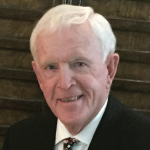

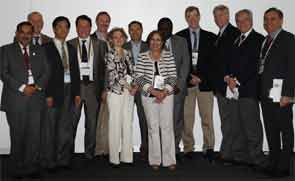
Clarification: Sunshine Act
Last month’s “President’s Perspective” covered some commonly asked questions about the Physician Payment Sunshine Act. We’d like to provide some additional information on one of the questions.
Q: I am an investigator on a study. Will my payments be reported?
A: Yes, payments or transfer of value that may be related to research funding is reportable.
Addition: Only the study’s principal investigator (PI) is linked to a study and included in the reporting. The manufacturer will report the total payment, who they made it to (contract research organization or university, site), and the information on the PI.
This month, it is a great honor to share my column with the ARHP President, Jan K. Richardson, PT, PhD, OCS, to discuss the ACR’s and ARHP’s strides in international collaboration. In rheumatology, we have the team of physicians, scientists, and health professionals working together to improve the care of our patients with rheumatic disease. We understand that collaboration is imperative to achieving best outcomes. In some cases, a collaboration can serve to share knowledge or experience, and in other cases, de novo projects may benefit from a collaborative approach. The ACR/ARHP collaboration has really advanced our field in myriad ways—our educational programs, our journals, our critical committee work.
The ACR’s mission is to Advance Rheumatology!, and part of our new strategic plan is a specific goal to increase the ACR’s international outreach and presence. We have heard from our international members about a desire to stay connected and to share our programs and products with their local communities—sometimes to provide key support in developing nations. We have heard from our colleagues representing international societies and leagues against rheumatism around the world, with a clear sense that collaboration will enhance the strength of our field—the science, the clinical care, the perceived value of rheumatology. To meet this critical strategic goal, we are collaborating with numerous rheumatology leagues and national organizations around the world, establishing new connections and strengthening time-honored efforts.
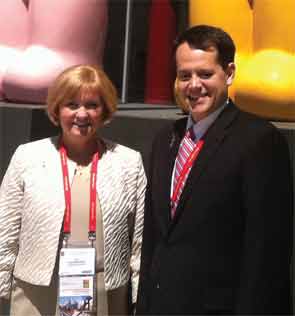
European League Against Rheumatism (EULAR)
Our history of collaboration with EULAR has been very fruitful. We began our partnership in 2006 with the joint development of criteria for rheumatic disease. Since that date, the EULAR Standing Committee for Clinical Affairs and the ACR Quality of Care Committee have published several joint papers: “Points to consider for reporting disease activity in rheumatoid arthritis clinical trials,” “Rheumatoid arthritis classification criteria,” “Rheumatoid arthritis remission criteria,” and “Polymyalgia rheumatica classification criteria.” In October, new ACR-EULAR Scleroderma Classification Criteria will be jointly published in Arthritis & Rheumatism and Annals of the Rheumatic Diseases.
Currently, the ACR and EULAR are jointly supporting projects to develop myositis classification criteria, myositis response criteria, vasculitis classification criteria, and gout classification criteria. We are also pleased to report that joint support of an ongoing pediatric macrophage activation syndrome classification criteria project began in July.
Since 2006, ARHP collaboration with EULAR’s Health Professionals in Rheumatology has included development of ACR/ARHP Annual Meeting joint sessions for health professionals and an educational article exchange. For the future, the two groups are partnering on a consensus document that focuses on the scope of practice of the rheumatology team and nonpharmacologic interventions for pain management in patients with rheumatic diseases and musculoskeletal conditions.
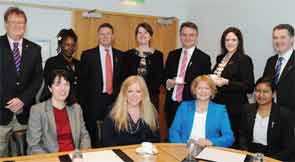
African League of Associations for Rheumatology (AFLAR)
In April, the ARHP was asked to participate in the 7th Congress of AFLAR and the 23rd Congress of the South African Rheumatism and Arthritis Association. ARHP’s immediate Past President, Benjamin J. Smith, PA-C, attended and presented three sessions: “The role of the nurse practitioner and physician assistants in rheumatology practice”; “Training and using physician assistants and nurse practitioners effectively in a rheumatology practice”; and “Why do my joints hurt?: Using case studies to review OA and RA diagnostic and treatment guidelines.” Attendee response was very positive, as the rheumatology community in Africa is considering methods to enhance their workforce, including investigating how to more fully utilize health professionals in caring for those with rheumatic diseases. In addition to his presentations, Smith shared information on the Advanced Rheumatology Course and Fundamentals of Rheumatology Course developed by the ARHP. We hope that these online educational opportunities for rheumatology health professionals will provide key support in developing the workforce on the African continent.
Asia-Pacific League of Associations for Rheumatology (APLAR)
This year we sent congratulations to APLAR for its upcoming 50th anniversary celebration. In recognition of the burgeoning strength of the field in a region with so much unmet need, the ACR will host an APLAR session at our 2014 annual meeting, where we will also celebrate APLAR’s 50th anniversary. We also look forward to presenting our review course at their 2014 congress in the Philippines.
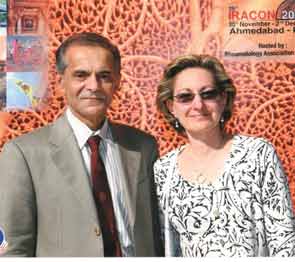
Pan-American League of Associations for Rheumatology (PANLAR)
The ACR is a proud member of PANLAR and provides review courses at their congresses, held every other year. We are currently developing an educational session for their 2014 congress, scheduled to be held in Punta del Este, Uruguay, next March. Beginning last year, we launched a partnership with PANLAR and the Society of Worldwide Medical Exchange to bring rheumatologists from developing countries in the PANLAR region to attend the ACR/ARHP Annual Meeting.
International League of Associations for Rheumatology (ILAR)
A focus on the developing world led to a recent restructuring of ILAR. Now, its mission is focused on advancing rheumatology in developing countries. The ILAR Executive Committee—consisting of the presidents and presidents elect of the ACR, AFLAR, APLAR, EULAR, and PANLAR—represents the strength and the potential in our field. The collaboration of these organizations has resulted in a renewed commitment to support programs that advance the practice of rheumatology and provide critical education in countries with exceptional need. Now a structurally and financially sound collaboration, ILAR has distributed over $525,000 for worthy projects around the world under the directorship of Mark Andrejeski, At our meeting in June, the ILAR Executive Committee agreed to make $125,000 available for grant funding in the coming year, advancing rheumatology and meeting ILAR’s unique mission. We are pleased to provide a session at the ACR/ARHP Annual Meeting that highlights the important work of ILAR and gives our attendees an overview of the collaborative’s impact around the world.
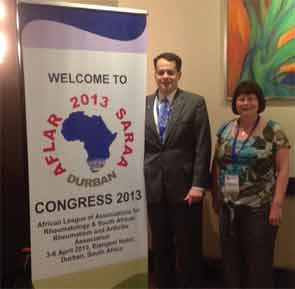
Indian Rheumatology Association
For the last two years, the ACR president has been invited to the Indian Rheumatology Association meeting. Dr. Uknis had the pleasure of representing the ACR last November in Ahmedabad, in the historic state of Gujarat on the west coast of India. It was a wonderful opportunity to share our experiences and best practices, and to plan for the possibility of training opportunities that will help build the rheumatology workforce in a country with extreme unmet need.
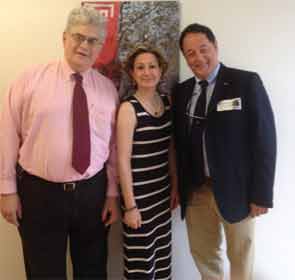
British Society for Rheumatology (BSR)
The ACR recently finalized a two-year licensing agreement with the BSR that makes the BSR the ACR’s partner in distributing its Simple Tasks campaign in the United Kingdom.
Over the next two years, the ACR will assist the BSR in implementing the campaign to increase the value of rheumatology among key influencers in the United Kingdom. More specifically, the U.K.version of the campaign will aim to increase commissioners’ understanding of the complexities involved in supporting people with rheumatic conditions, increase commissioner support of multidisciplinary rheumatology teams, and foster earlier diagnosis and treatment for people with rheumatic conditions.
Also, ARHP President Dr. Richardson joined the BSR for its annual meeting in April, where she witnessed the fruition of 12 months of collaborative work between the ARHP and the BSR’s British Health Professionals in Rheumatology (BHPR). Similar to the ACR/ARHP, the BSR/BHPR determined that, since people with rheumatic diseases should be treated by a team of rheumatology professionals, there should be one society representing them. To assist BRS/BHRP in their restructuring and merger into one organization, ARHP leadership and staff served as consultants to the BSR/BHPR.
The scope and importance of ACR and ARHP international collaboration is impressive and growing every day. The tangible benefit will be to our members and the global rheumatology community as we advance rheumatology around the world. Based on our record of success, we would predict that the future is bright for continued productive collaborations!
Dr. Uknis is professor of medicine and senior associate dean for admissions and strategy at Temple University in Philadelphia. Contact her at [email protected].
Dr. Richardson is chief clinical officer for Universal SmartComp of Washington, PA, and professor emeritus with Duke University Medical Center School of Medicine in Durham, N.C. Contact her at [email protected].
ILAR Call for Proposals
Help advance rheumatology in developing countries. ILAR is issuing its yearly request for proposals for projects that advance rheumatology in developing countries.
ILAR is soliciting proposals for projects for the funding year January 1–December 31, 2014. ILAR welcomes project proposals for grants between the amounts of $5,000 and $30,000 U.S. In total, ILAR will fund at least $125,000 of projects in 2014. ILAR’s intent in funding these projects is to provide seed money to help initiate meritorious projects that will eventually be eligible for other sources of funding.
For more information and to submit your project for consideration, visit www.ilar.org. The deadline for to submit projects for consideration is Monday, September 16.
